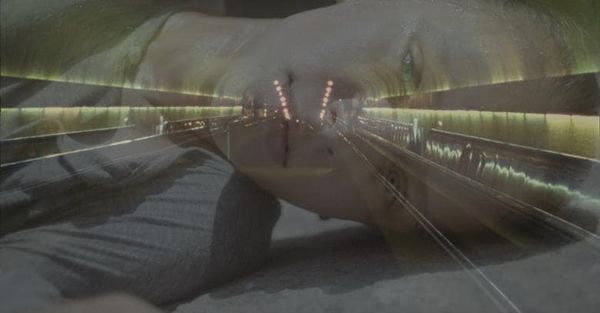Eye For Film >> Movies >> Ecstasy (2020) Film Review
Ecstasy
Reviewed by: Amber Wilkinson

This impressionistic documentary from first-time feature director Moara Passoni draws on her own experience of anorexia in childhood and that of other women with the eating disorder she met while researching the project. Told in the first person, by a girl called Clara, recounting her story, it is a fictionalised composite of Passoni's recollections and those of the others, resulting in an immersive journey to the emotional heart of anorexia.
The blending of documentary with a fictional story allows Passoni to move forward and backward in time, so that we hear Clara talking about experiences in the womb - accompanied by the sight of her mother, an activist who goes on to be a congresswoman - standing in front of riot police. As she grows older she charts the increasingly antagonistic relationship with her body, as Passoni and cinematographer Janice d’Avila pack the screen with rich imagery that fades from one idea to the next to key us into Clara's emotional state - from ballet classes with a heightened sound design that emphasises every flex of foot, to the "blue dot" which the girl says she started to focus on every time she felt hungry.
The sound design from Cécile Chagnaud adds texture to Clara's experience throughout, whether its her child's voice and older self overlapping, birds cawing or in the emphasised exertion of a young woman running - all of which dovetails with a score by David Lynch and Swedish singer-songwriter Likke Li.
Passoni conveys the paradoxes of a disease, which emaciates Clara but also gives her feelings of control and exaltation - the ecstasy of the film's title. She uses architecture to emphasise the way the young woman views her body - making her a student architect studying physical buildings but also showing how she wishes to deconstruct her own self. Religion and politics play into this to a degree, but the emphasis is firmly on Clara's mindset and her inner battle with the illness. There are a handful of images of, presumably, the director at the height of her struggle with the disease - something that one hopes will not go on to be seen as 'thinspiration' by other sufferers - but they are used judiciously and used only to illustrate the truth of Clara's predicament. An excellent example of how the extremely personal can hold universal insight.
Reviewed on: 25 Mar 2020














